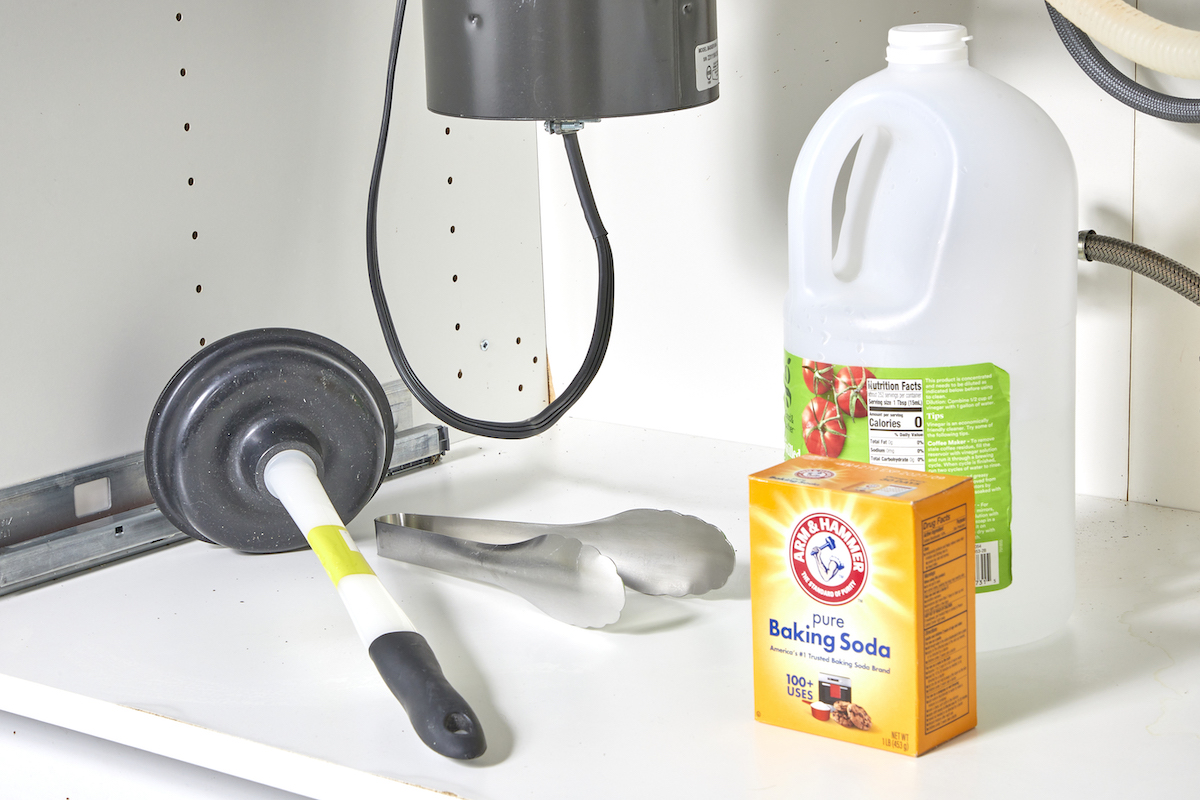We may earn revenue from the products available on this page and participate in affiliate programs. Learn More ›
When faced with the conundrum of how to unclog a garbage disposal, most people would say that the easiest solution is to call a plumber. The easiest choice, however, may not always be the fastest or most cost-effective solution. Learning how to fix a garbage disposal on your own is easy, and requires nothing more than a few pantry staples and some tools you probably already have. Clearing the clog yourself could save you the cost of a service call (which, in most places, is over $100). Less tangible but no less important, you’ll also gain valuable DIY experience, and confidence to take on even more complicated repairs in the future.
Project Overview
Working Time: 15 minutes
Total Time: 20 minutes
Skill Level: Beginner
Estimated Cost: $0 to $15
Before You Begin
A homeowner’s knee-jerk response to a clogged garbage disposal is often to stick a hand into the appliance and attempt to dislodge whatever is causing the clog. Don’t! You’re risking a grisly injury by exposing your fingers to the disposal’s blades. Cut off power to this potentially harmful appliance at the breaker before you make any attempts to unclog a garbage disposal. Because the food scraps and other gunk inside a garbage disposal are pretty gross you may want to don some dishwashing gloves before you get started, too.
Tools & Materials
Bobvila.com may earn a commission from purchases made through these links.
How to Unclog a Garbage Disposal Safely
Step 1: Turn off the power at the breaker box.
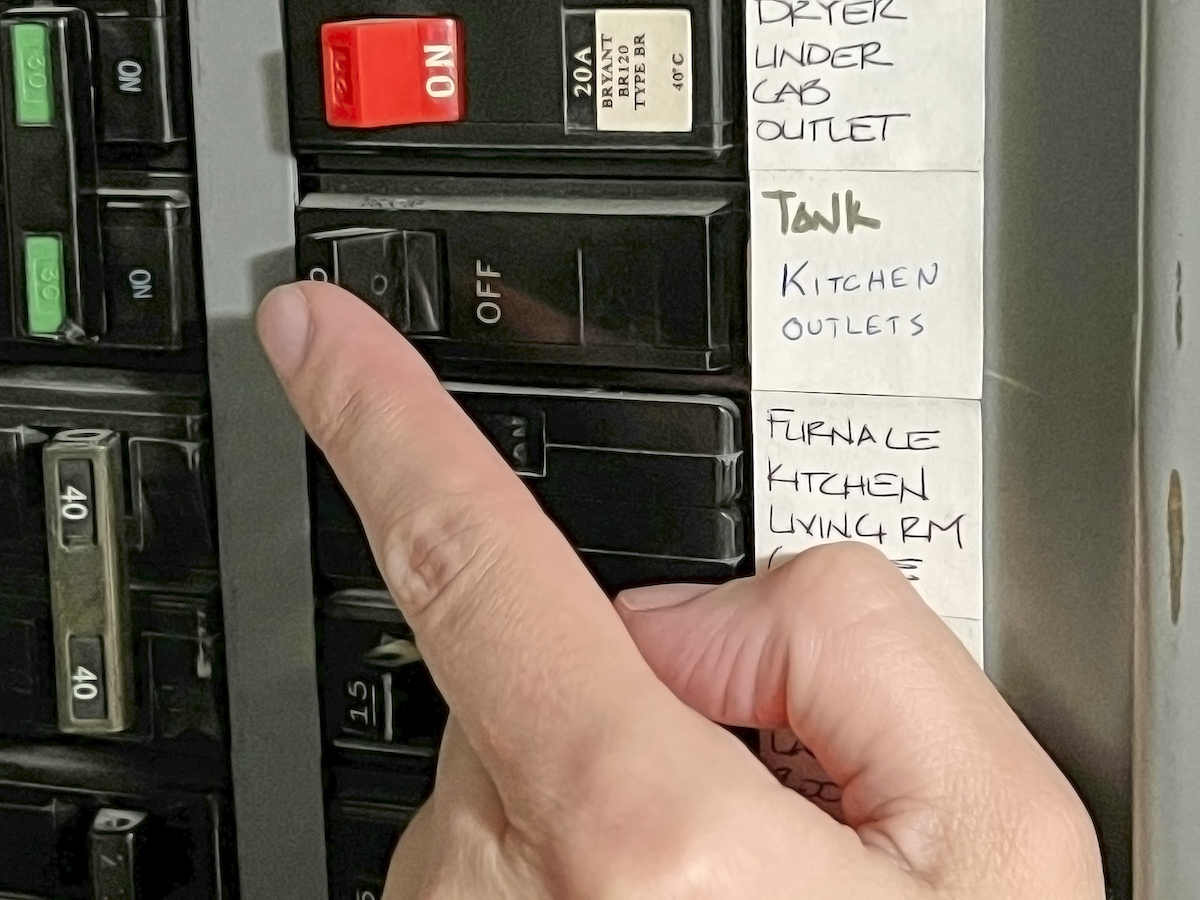
For homeowners attempting repairs, the first thing to do is turn off the breaker that controls the disposal. A successful home repair will never be as memorable as a trip to the emergency room.

Tried-and-True Advice
If my garbage disposal ever starts to run slow, I always use distilled vinegar and baking soda to tackle the clog. First, I make sure everything is turned off and then I pour about 1 cup of baking soda into the disposal followed by an equal amount of distilled white vinegar. As quick as I can, I cover up the drain with a plate or plunger, which I find channels the vinegar and baking soda mix down into the drain to bust through the clog a bit better. Once the vinegar and baking soda stops bubbling, I carefully pour a pot of hot water into the drain and that usually takes out the rest of the clog—no chemicals needed!
—Lauren Landers, Contributing Writer
Step 2: Try to identify what is causing the clog.

Once the breaker is turned off, shine a flashlight into the disposal. Do you see any objects that could be causing the clog? If so, use a pair of long-handled tongs or pliers to carefully retrieve these items and clear the way. Once all visible items have been removed, turn the breaker back on, turn the water on, and then turn on the disposal. (It may be necessary to push the reset button on the disposal—it’s usually found on the underside of the appliance.)
If it drains water and works properly, give yourself a pat on the back. If the disposal is still clogged, continue to Step 3.
Step 3: Use a plunger to clear leftover food scraps.
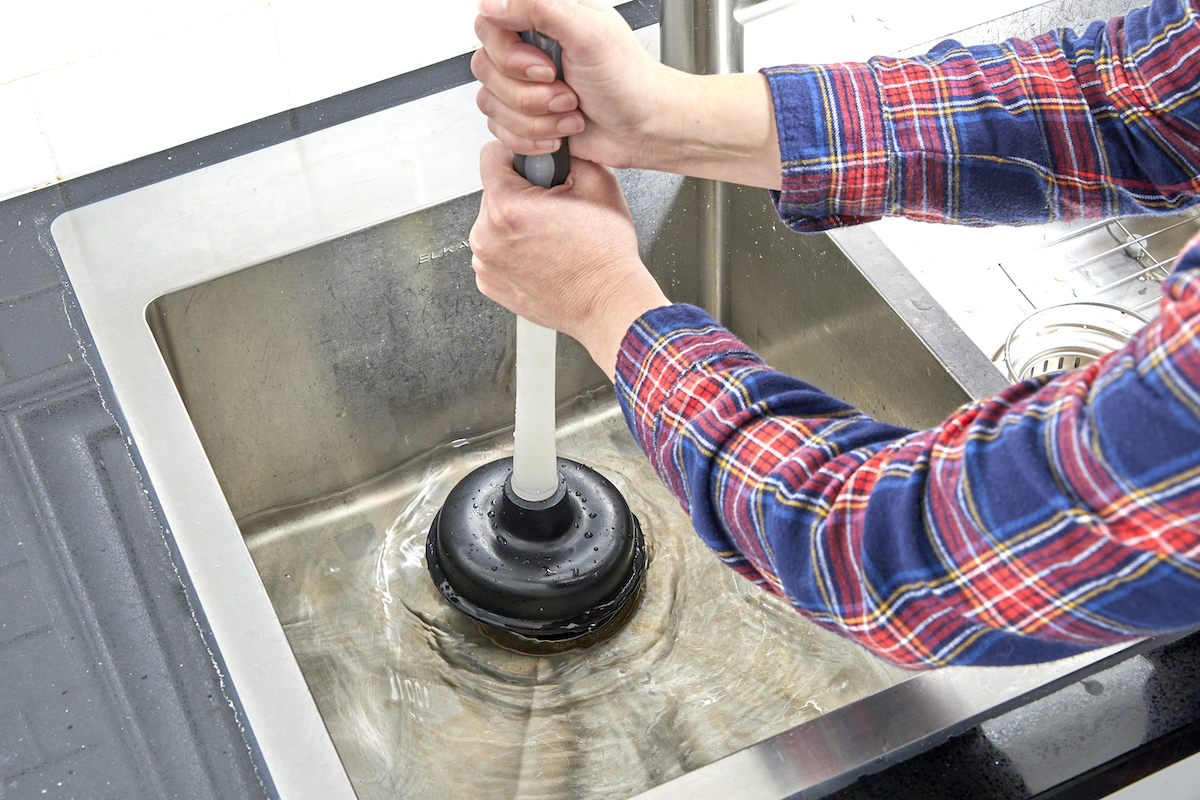
Turn the breaker off again. Since there are no more foreign objects to retrieve, it’s time to consider another cause of the clog: lingering leftovers. Food can clog a garbage disposal when it isn’t broken down enough to be flushed out of the drainpipe. In these situations, it’s helpful to use a plunger first to try to loosen food that has clogged the disposal.
After covering the drain completely with the plunger, allow water to cover the edge of the plunger and plunge the drain a few times. If water begins to drain, it’s a good sign that food scraps might do likewise. If so, turn on the breaker and disposal to see if the food remnants can be processed through the drainpipe. If they don’t budge, it may be time to prepare a cocktail—for the clogged drain, that is.
Step 4: Use baking soda and vinegar to dislodge the clog.
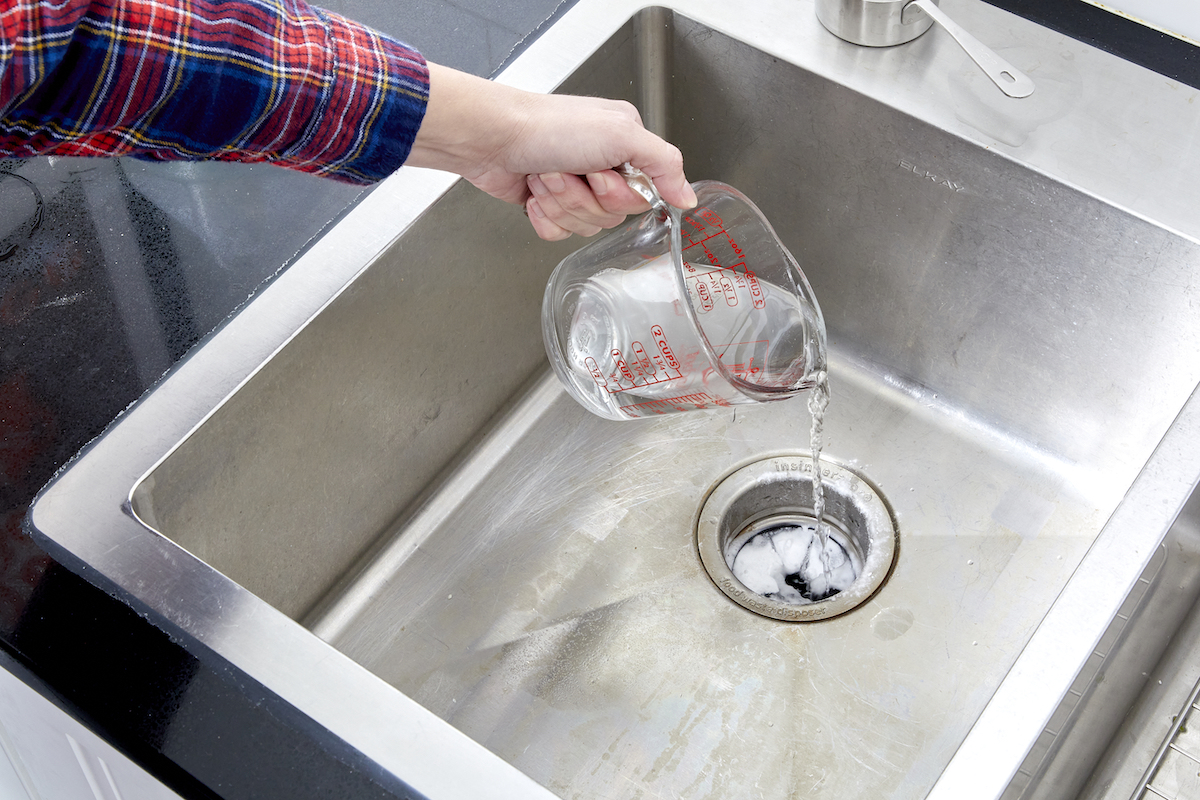
Many garbage disposals contain plastic parts, and using harsh drain cleaners can degrade those parts. The combination of baking soda and vinegar offers comparable unclogging power, but on a much gentler scale.
Ensure again that the breaker and disposal are both powered off, and pour ¼ cup of baking soda into the garbage disposal. Next, pour ½ cup of white vinegar over the baking soda, and be prepared for fizz and foam.
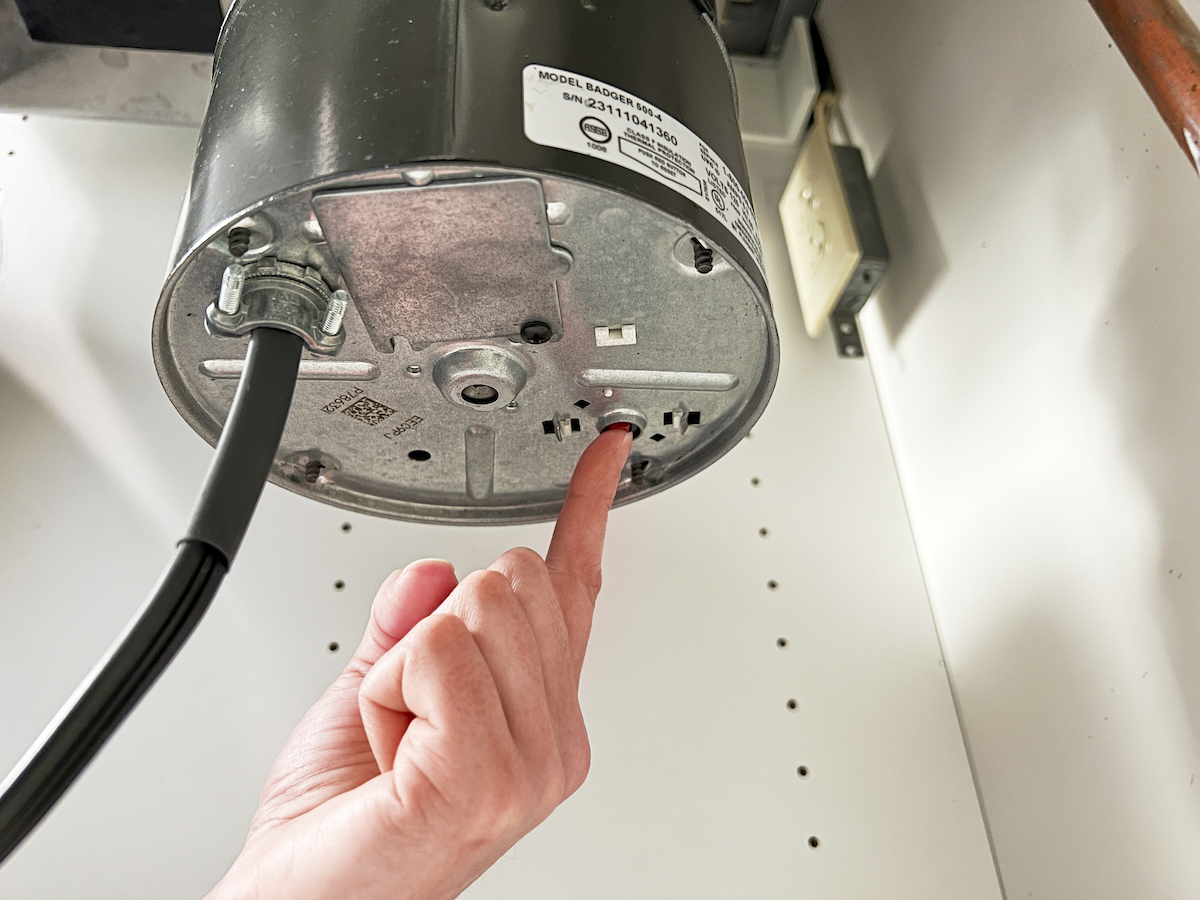
After 5 to 10 minutes, turn the breaker and the disposal back on and run hot water into the disposal for another couple of minutes. (Again, you may have to hit the garbage disposal reset button to get it started.) If the disposal is functioning properly, call it a day and make yourself a cocktail this time. If not, proceed to Step 5.
Step 5: If all else fails, call a plumber.
Turn the appliance and the power back off and call a plumber. After the plumber clears the problem and goes on her way, however, there’s ongoing maintenance to be done. To prevent another clog, it’s important to maintain the appliance by following the steps outlined below. Just a few minutes of maintenance every few weeks can save you headaches down the road.
How to Prevent Garbage Disposal Clogs
- Run the disposal every day. Most machines benefit from regular use, and this is especially true of a garbage disposal. Water and food particles can cause corrosion to form on the garbage disposal’s moving parts, causing it to potentially freeze up. Prevent this corrosion by running cold water through the garbage disposal every day, even if there’s nothing for it to chew on.
- Run your garbage disposal for a long time. Keep the garbage disposal running for a full minute even after it’s done grinding up food. This will ensure that all the food particles have been broken up and cleaned out of the disposal.
- Grind up citrus scraps. Used lemon wedges and orange rinds make a great garbage disposal cleaner. Grinding acidic citrus rinds cleans away any food scraps clinging to the garbage disposal and leaves behind a pleasing citrus scent.
- Don’t force the garbage disposal to bite off more than it can chew. Garbage disposals may have powerful motors, but they still have their limits. Stuffing large chunks of food down the sink drain forces the motor to work harder and may even cause it to freeze up. Cut large pieces of food into smaller chunks before placing them in the garbage disposal to avoid overwhelming the motor.
Final Thoughts
A clogged garbage disposal can be a pain, especially when it happens an hour before a dinner party. Most clogs are pretty simple for novice DIYers to fix. Always remember to turn off power to the appliance before taking any steps to unclog it. The best way to deal with clogs is to prevent them altogether with regular garbage disposal care and taking easy steps to prevent said clogs, including using the disposal daily.
FAQs
If your garbage disposal isn’t draining, it’s likely because there is food waste clogging the drain. Running the garbage disposal should clear this waste and cause the disposal to drain. A garbage disposal that won’t turn on likely has a clog that needs to be cleared. If the appliance is functioning properly, it’s possible that the culprit is a clog in the sink’s drain piping.
The vigorous reaction that occurs when vinegar mixes with baking soda can be enough to clear minor to moderate clogs in a garbage disposal. Pour ½ cup of baking soda into the garbage disposal, add a cup of vinegar, plug the drain and wait for 10 minutes. Then rinse the disposal with hot water.
A severely clogged garbage disposal is a job for a professional plumber. Plumbers are not only capable of unclogging a garbage disposal, they can also install a new garbage disposal if the old one is kaput.
You can use a plunger to attempt to unclog a garbage disposal. Begin by clamping the rubber drain line that leads from the drain to the dishwasher. This will allow you to create the necessary pressure inside the garbage disposal to plunge. Place a plunger over the drain then add a few inches of water to the sink. Plunge about a dozen times to dislodge the clog.
A double kitchen sink has a standard drain on one side and the garbage disposal on the other. Begin by sealing off the regular drain, then plunge the garbage disposal side to clear any food causing the clog. Next, plunge the other side while covering the garbage disposal drain.
If the clog is not severe, you can unclog a garbage disposal in about 15 minutes using either a plunger or a mix of baking soda and vinegar. If the clog is severe, you may need to call in a professional plumber to clear the drain.

